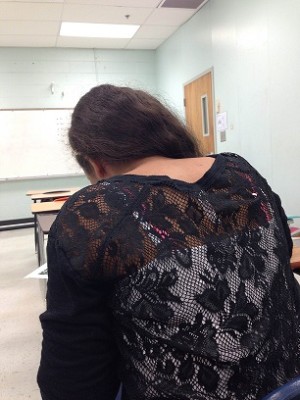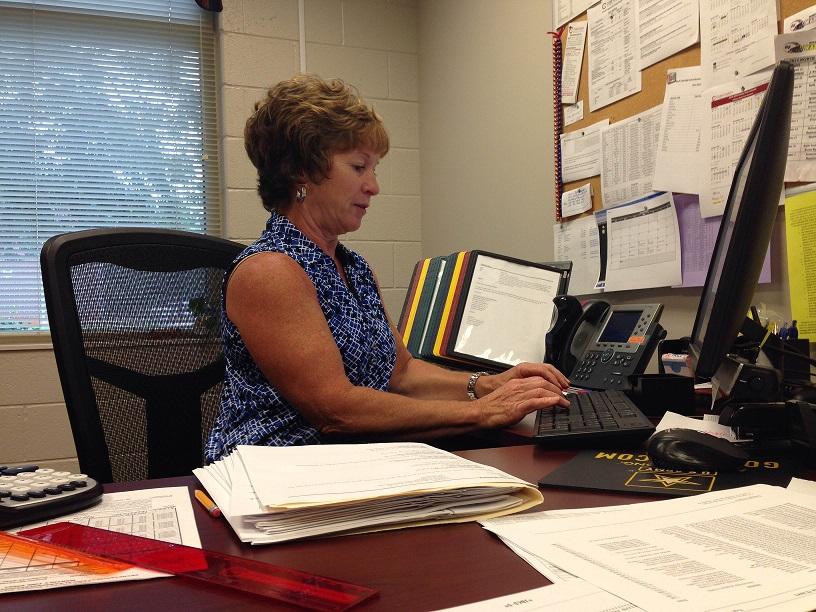Dress code violations top priority much to student dismay
Mrs. Parisay, school secretary, handles the majority of dress code violations. “We just need to keep on it and not give up,” Parisay said. “It’s stayed the same,” she said, when asked whether the crack down on dress code violations have improved the issues.
August 19, 2014
School dress codes have created some controversy between students and administrators during the first three weeks of the 2014-2015 school year because of differing opinions between what an administrator deems inappropriate versus what students perceive as perfectly harmless fashion choices.
“Since the beginning of the year they put such a huge emphasis on dress code and how short your shorts are and not showing your shoulders and stuff like that, but I feel like there’s a difference between having a pair of shorts that don’t exactly particularly reach the end of your fingertips and shorts that are indecent. They’re making all these rules and they’re focusing on dress code a lot instead of focusing on other stuff. They could be fixing real problems instead of something harmless like shoulders showing. At some point certain fashion decisions can go too far, but this is kind of like an iron fist reign,” junior Samira Parsa said.
Dress codes have not always affected students in such a way. For example, according to parents and in observing yearbooks as evidence, in the 1980s students could largely wear what they wanted, with little to no consequence.
However, the fashion industry also produced more modest varieties of clothes, so there proved no urgent need to enforce a severe dress code. Beginning in 1997, dress codes imposed rules on “appropriate dressing” in schools. Objects of clothing that were deemed too short or showed shoulders became banned. Students also find that these restrictions mostly gear towards females and not males. Restrictions included low cut shirts, tight pants, shorts shorter than finger tips, and overexposed shoulders.
“It is sexist. It is aimed at what girls can’t wear. No short skirts, no tank tops, no low necklines. What restrictions do guys have? No sagging? But still, that is not as heavily enforced as girl’s dress codes,” said junior Rebecca Goldstein.

This student (who asked to remain anonymous)’s second period teacher sent her to in school suspension because the straps of her tank top and her bra were showing through the sheer backing of the shirt she bought. When asked what the student thought of the punishment, she said, “I just thought the shirt was cute, not offensive.”
At the recent NC student seminar, dress code enforcement and rules led as a pressing topic. Students were informed that if they refused to wear the proper clothing and could not produce an acceptable alternative, they would sit in ISS and miss class time, until the student could cover up.
“I believe dress code shouldn’t be a restriction on what we should wear, because we want to express ourselves. Now I agree that some are a bit more provocative than others. But, when it comes to women, I think they should dress freely,” said senior Kalvin Schamerhorn.
Students believe that if their outfits are not actively distracting others, then they should not provoke a direct write-up or a negative citation, but clerks who handle the majority of the dress code violations feel differently.
Mrs. Baker, Administration I clerk said, “I don’t think kids are purposefully trying to offend others. I don’t know. If I look at them and am not wowed or offended, then I just let them go. It’s really hard for us when they get sent up during third period during lunch. It would be a lot more helpful if teachers would just do a quick glance around the room at the beginning of the day. I think the cracking down has made it better. I think it’s gotten better.”








Fred • Aug 23, 2014 at 10:41 PM
I love how we cannot show our shoulders yet above is a picture of an adult official wearing a shirt that clearly shows her shoulders.